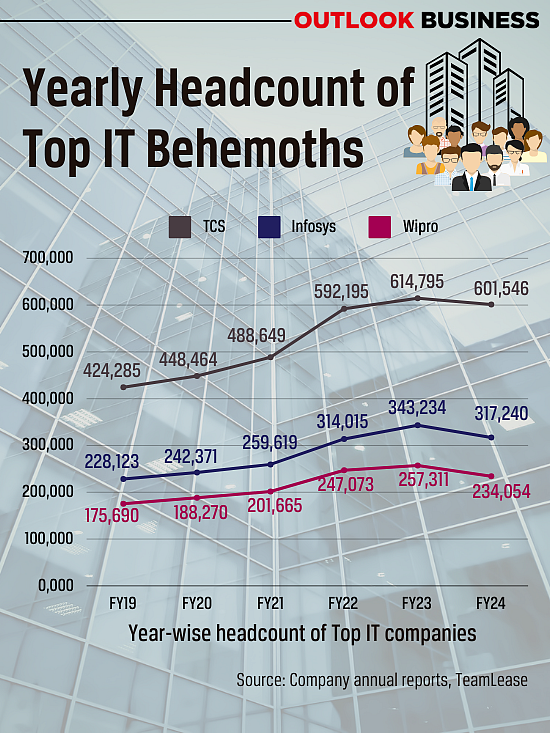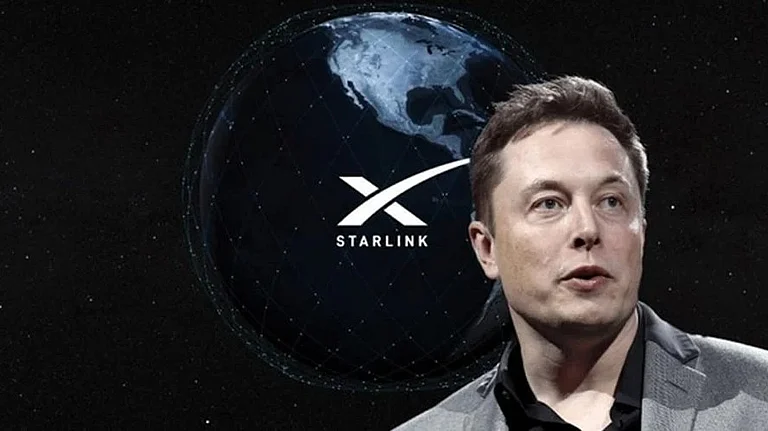In the 1990s, when India was on the verge of an Information Technology (IT) boom, no one thought that the industry would grow to become the country’s most globalised sector. Almost no one could imagine that millions of Indians would sit in front of computer screens, writing code and making software services for the world to use.
Quarter of a century later, India’s booming IT sector has started faltering. And it is not because of geopolitical tensions or external dependencies—but generative artificial intelligence (Gen AI).
Signs of the falter have been evident for some time now. Several IT giants have announced massive layoffs over the last year. For sure, these companies will adopt Gen AI. And as AI enters the doors, many might have to walk out.
Wipro and Infosys—two of the country’s largest IT services companies—have not only seen an overall drop in headcount but these companies have also pushed pause on campus-hirings. For years, these companies, along with Tata Consultancy Services (TCS), were places of hope for millions of Indians graduating from thousands of engineering colleges. In the years following the IT boom, engineering degrees had become a sure-fire way to secure upward social mobility. But now the space is shrinking and shrinking rapidly.
Heads Start Rolling
Data compiled by TeamLease, a Bengaluru-based recruitment services company, shows that the three IT giants—Wipro, Infosys and TCS—saw a 5.4 per cent drop in average headcount in the last fiscal. While it is true that geopolitical concerns such as the crisis in West Asia and the Russia-Ukraine war have weighed on businesses across sectors, the IT industry’s pessimism has been compounded by the outlook for AI.

TCS has said it will be doubling down on its focus on AI technologies boosting its deal pipeline in the space to $900 million. Wipro said in its exchange filing that as AI takes centre-stage (alongside a shift towards more intellectual property-based platforms) there could be further divergence in terms of headcount.
Infosys, however, seems to be focused on retraining its employees. Salil Parekh, the chief executive of the IT behemoth said in a recent interview: “Infosys is not looking at rightsizing, downsizing or any kind of job cuts as happened with others due to GenAI.” In another interaction reported by Moneycontrol, Parekh said the company is working on 200 Gen AI projects with six out of eight employees receiving training on various aspects of new technology.
But a slowdown in the generation of tech jobs is definitely on the cards, according to Krishna Vij, business head at TeamLease Digital. Vij says, “Our estimate suggests a 7–8 per cent growth in workforce which is slow when compared to industry standards.”
An AI Boom in the Making?
While GenAI takes jobs in the IT industry, experts say there is a large gap in supply and demand of jobs within the GenAI space. Companies are increasingly looking to fill specialised AI roles, but the talent that exists in the industry is falling short. There is broad consensus among leaders of big IT businesses that AI will be as transformative as transformative technologies that came before it.
But Howard Boville, executive vice president and global lead of applications services at the US-based DXC Technology, says GenAI needs a different approach compared to previous technologies. Boville says that unlike cloud computing, a technology that operates at a broader level, GenAI plays at smaller elements of the company like individuals within departments. He adds, "There are uncertainties but I am hopeful that GenAI can create more jobs in the future for the Indian IT industry."
People walking out of college into jobs that require AI application may find it relatively easy to make the pivot, but the challenge is more severe for mid-level employees. “In this push for AI and freshers, mid-level employees can see the most churn as roles and responsibilities evolve. But in this hiring drive, a key plank would be off campus hiring to keep costs in check,” says Vij.
Is there a Reason to Hope?
The Indian IT industry has been under significant strain of late. On a year-to-date basis, the Nifty IT index has delivered a negative return of 4.76 per cent even as benchmark indices have been on a high. The rise of AI can soon start hurting the sector that was once the crown jewel of the Indian services economy.
The Indian IT industry cannot overlook the fact that the world is shifting to a more lucrative and advanced form of technology, and this can eventually impact how hiring happens in the sector. Last year, Wipro and Infosys saw C-suite level exits. Consultants at McKinsey say the nature of generative AI and the speed at which it functions is bound to create uncertainty. According to a report by Quantum Black, the AI analytics division of McKinsey & Co., business leaders should expect daunting challenges such as shortage of talent, a lack of organisational commitment and difficulties in justifying return-on-investment (RoI) in certain cases.
What this means for the thousands of Indian techies who entered the workforce in the 2000s and have now settled into cushy jobs remains to be seen, but the scope for optimism is limited. For those entering the workforce now, there potentially is a lot of opportunity but no clear sense of direction.
(With inputs from Ayaan Kartik)
































